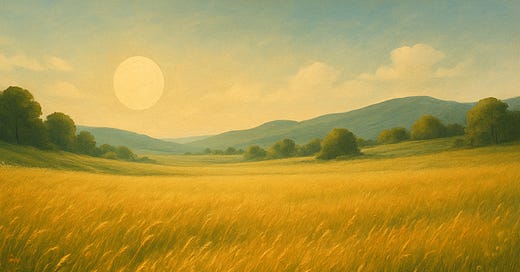Editor’s Note: I realized that the original piece may have pushed a narrative that I didn’t fully agree with, but didn’t see it until I read it later. This new version is much closer to the ideas that I’m trying to understand. Thanks all, and this is a testament that I’m still learning, still growing. Appreciate you for tagging along for the journey.
"The master does nothing, yet he leaves nothing undone.
The ordinary man is always doing things, yet many more are left to be done.”
— Lao Tzu
We look for clear paths,
for proven ways to lead,
to be strong.
The old story often tells us
power is taken,
strength is about
being the toughest,
the one in control.
But what if that’s only one story?
What if true strength,
lasting power,
the kind that builds and heals,
whispers a different tune?
A tune
of shared voices,
of balance,
of a deeper harmony.
I don't have all the answers.
I'm exploring, too.
But this different way feels
closer to something true and lasting.
Power With, Not Power Over
Think about the moments
true strength really shines:
A mentor helps someone
find their own voice.
A family makes decisions
where everyone feels heard.
A team thrives because
ideas flow freely, from everyone.
These aren't about
one person dominating.
They're about
shared purpose.
Shared trust.
Shared power.
What if strength
isn't about how much
you can control,
but how much you can empower together?
The Wisdom of the River, The Tree
Nature often shows us:
The mighty tree bends in the storm.
The patient river flows and reshapes the land.
This isn't weakness.
It's smart strength.
Adaptability.
Knowing when to stand firm,
and when to flow with life,
not against it.
What if our own strength
could be more like that?
Flexible.
Responsive.
Moving with wisdom,
not just rigid force.
Learning from Other Ways
History isn't just one
story of conquest.
There are many stories,
many ways people
have lived,
organized,
and led.
Some cultures built their strength
on balance,
on shared responsibility,
on ensuring many voices,
including those of women and elders,
shaped their community's path.
They valued long-term
well-being over short-term gain.
We don't need to copy them.
But we can learn from
the idea that power shared,
that leadership rooted in community care,
can create societies that are strong,
resilient, and deeply connected.
What principles can we find
there to help us draw our own new maps?
Love and Care as Action
What if love,
what if deep care for others
and for justice,
wasn't just a "soft" feeling,
but a powerful,
active force
for leading,
for making change?
Thinkers like bell hooks
saw love this way:
as a commitment
to fairness,
to healing,
to building communities
where everyone can thrive.
Where justice isn't just about punishment,
but about repair,
about making things right,
together.
What if strength
meant using our abilities
to nurture,
to support,
to ensure fairness,
to build up,
not tear down?
This isn't about
being a savior;
it's about being a partner,
an ally.
A Simple Shift to Try
This week,
in any situation where you might
usually take full control,
or push your way through:
Pause.
Ask yourself:
Is there a way to share this?
To listen more deeply?
To find balance here?
To lead with care,
even if it means being firm?
Just notice what happens
if you choose a
slightly different approach,
one aimed at shared understanding
or a more balanced outcome.
Finding a New Harmony
Maybe real strength
isn't about winning
every battle through force.
Maybe it's about
finding a deeper harmony—
within ourselves,
with each other,
with the world.
A harmony built on:
Shared voices.
Being flexible
and yielding when needed.
Approaching life caring deeply,
and acting rightly.
I'm still learning
what this looks like.
But exploring this path,
this idea of a strength found
in connection,
in shared power,
in a mindset that lives to serve all—
this feels like the closest thing
to "right" I know so far.
It feels like a map
worth drawing,
together.



